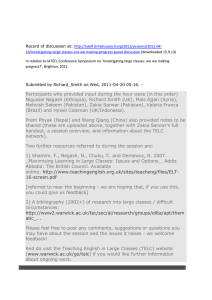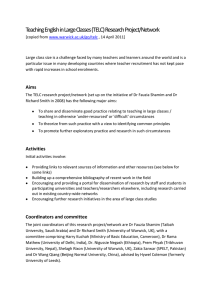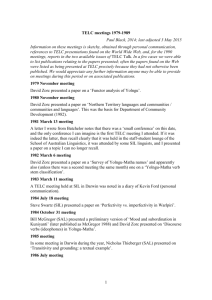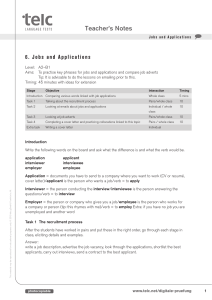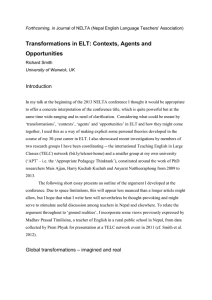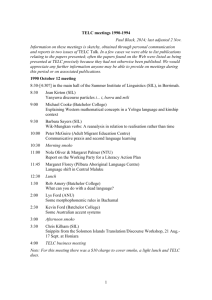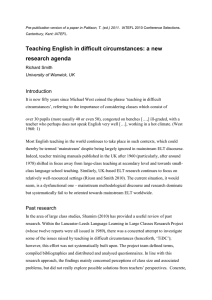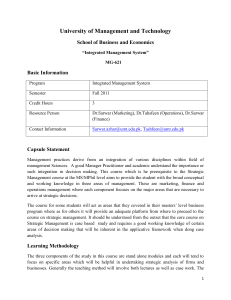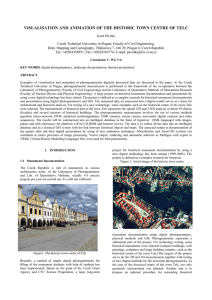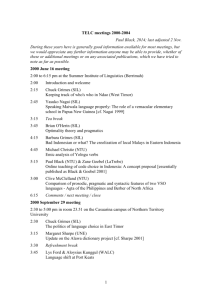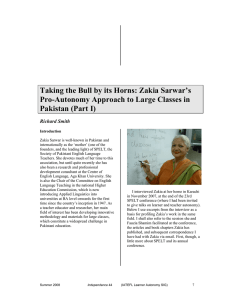Investigating large classes (panel discussion)
advertisement
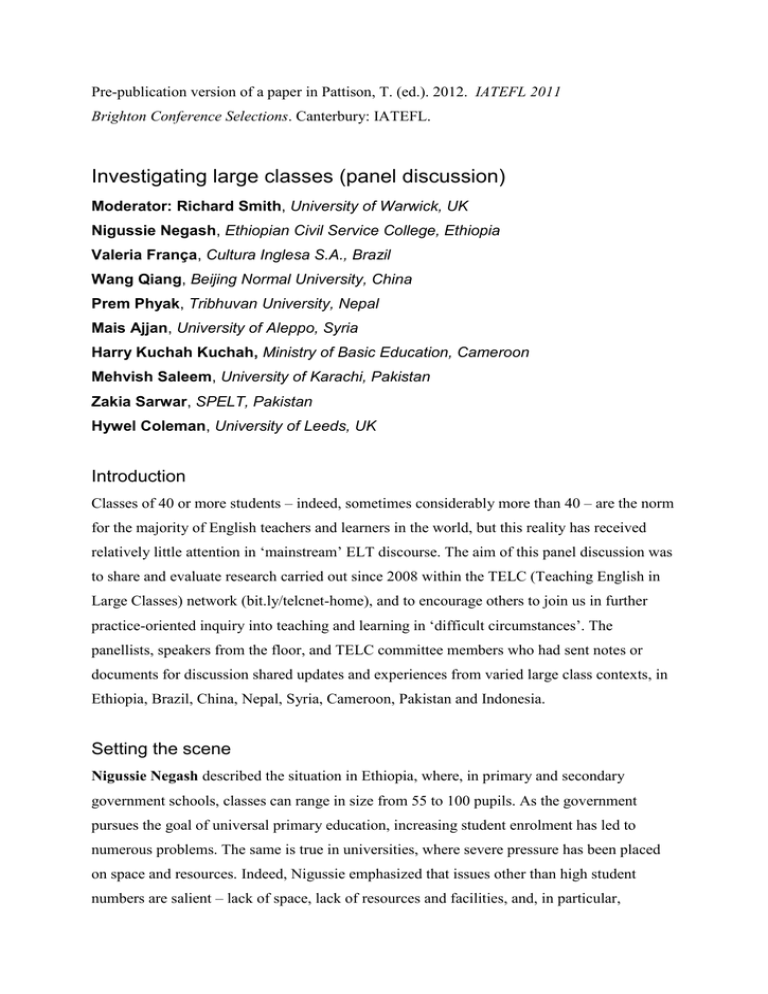
Pre-publication version of a paper in Pattison, T. (ed.). 2012. IATEFL 2011 Brighton Conference Selections. Canterbury: IATEFL. Investigating large classes (panel discussion) Moderator: Richard Smith, University of Warwick, UK Nigussie Negash, Ethiopian Civil Service College, Ethiopia Valeria França, Cultura Inglesa S.A., Brazil Wang Qiang, Beijing Normal University, China Prem Phyak, Tribhuvan University, Nepal Mais Ajjan, University of Aleppo, Syria Harry Kuchah Kuchah, Ministry of Basic Education, Cameroon Mehvish Saleem, University of Karachi, Pakistan Zakia Sarwar, SPELT, Pakistan Hywel Coleman, University of Leeds, UK Introduction Classes of 40 or more students – indeed, sometimes considerably more than 40 – are the norm for the majority of English teachers and learners in the world, but this reality has received relatively little attention in ‘mainstream’ ELT discourse. The aim of this panel discussion was to share and evaluate research carried out since 2008 within the TELC (Teaching English in Large Classes) network (bit.ly/telcnet-home), and to encourage others to join us in further practice-oriented inquiry into teaching and learning in ‘difficult circumstances’. The panellists, speakers from the floor, and TELC committee members who had sent notes or documents for discussion shared updates and experiences from varied large class contexts, in Ethiopia, Brazil, China, Nepal, Syria, Cameroon, Pakistan and Indonesia. Setting the scene Nigussie Negash described the situation in Ethiopia, where, in primary and secondary government schools, classes can range in size from 55 to 100 pupils. As the government pursues the goal of universal primary education, increasing student enrolment has led to numerous problems. The same is true in universities, where severe pressure has been placed on space and resources. Indeed, Nigussie emphasized that issues other than high student numbers are salient – lack of space, lack of resources and facilities, and, in particular, inadequate training of teachers for coping with the problems they face, including how to handle different age groups and abilities in one class. Nigussie highlighted the need for comprehensive retraining programmes based on practical skills, along with improved initial teacher training to cater for the realities of teaching in difficult circumstances. Valeria França also described a difficult ‘baseline’ situation, this time in Rio de Janeiro, Brazil, where she has been training state school teachers involved in a shift towards oral skills and towards teaching young learners in preparation for the 2014 World Cup and the 2016 Olympic Games. Class sizes of 40–50 are normal, with desks being fixed to the floor. How to help teachers establish rapport, understand classroom dynamics, and deal with classroom organization and discipline are among the challenges currently facing Valeria and her colleagues. Defining research priorities One problem is that that not enough relevant material exists for teacher education purposes. With Fauzia Shamim and others, Nigussie Negash has himself co-authored a book of workshop activities (Shamim et al. 2007) whose use is being promoted within the TELC network, with a view to furthering an exchange of experiences and ideas among teacher educators. Providing an update on the situation in China, Wang Qiang made available a useful overview of Chinese research into large class teaching (Wang and Zhang 2011), including a summary of practical suggestions which could underpin teacher education in China, with relevance also elsewhere. As Richard Smith reported, efforts have been made to gather together and disseminate existing resources for teacher educators and teachers via the TELC network’s website (bit.ly/telcnet-home). An online bibliography containing some hyperlinks to online publications (Ajjan et al. 2010) has also been compiled. Regarding original research, there seem to be particular needs and opportunities for inquiries which reject preconceptions of small-class teaching as norm and teaching in large classes as a ‘problem’ and which seek instead to describe ‘good practice’ / ‘appropriate methodologies’ as perceived by teachers and learners themselves (cf. Smith 2010). Richard described how TELC committee members have been gathering together stories from teachers in difficult circumstances, in the hope that these can serve as a basis for synthesis of insights and/or be useful teacher development material in their own right. He distributed two such stories sent from Nepal by Prem Phyak which shed light on the specific difficulties involved in large class teaching, but which also illustrate potential benefits of large, multicultural classes when students are viewed as a resource. Qualitative inquiry The nature and usefulness of a qualitative, case study approach to research was further illustrated with reference to two doctoral studies being undertaken at the University of Warwick. Mais Ajjan reported on her work eliciting student perspectives on the characteristics of ‘good’ large class teaching in a Syrian university, based on participant observation and interviews. Classes were observed over a period of six weeks in four different courses taught by different tutors to the same large group of (400+) students. First phase findings revealed that students did not mind being in a large class so long as they were taught by good lecturers. This motivated the second phase, which aimed to look more closely at ‘popular teachers’ and at the ‘successful’ teaching strategies they have developed. Initial analysis seems to indicate that ‘being friendly’ and ‘engaging in interaction’ are the attributes of good teachers that students value most highly, while, for them, being mentally engaged is as important as being kept verbally active. Harry Kuchah Kuchah has also been exploring aspects of appropriate methodology, this time in Cameroonian primary schools. By observing and interviewing teachers generally perceived to be effective (according to inspectors, head teachers, exam results and children themselves), and then using video-recordings of their lessons as a basis for discussion with other teachers in both urban and rural areas, Harry is hoping to derive suggestions in a bottom-up manner which can inform teacher education and curriculum reform in the Cameroonian context and perhaps further afield. Practitioner research Another kind of exploratory inquiry being promoted within the TELC network is practitioner research, this being another way for large class teaching methodologies to be developed on the basis of insights from those most centrally involved. Mehvish Saleem reported on an action research initiative to enhance learner engagement and communication skills through group work in a university class she taught in Pakistan. Forty freshmen participated in this study over twelve lessons. Data was mainly collected via feedback forms and slips handed in at the end of class. After four lessons, students were already appreciating group work and becoming much more willing to talk in front of the whole class. Later, students even began to come up with their own ideas for group work activity. As Mehvish emphasized, feedback from students led her to innovate in ways not originally planned, including defining clearer learning objectives and assessment criteria. Zakia Sarwar also explained how since 1983 she has been attempting to address problems of teaching in difficult circumstances in Pakistan, starting with her own practice. At first, she was unaware of the terms ‘action research’ and ‘learner autonomy’, both of which – she now perceives – have underpinned her approach. The self-study and collaborative learning activities she originally devised for a group of 102 students have subsequently been adapted for use by other teachers (Sarwar 2011). Overall, Zakia feels she has demonstrated that there can be creative and viable solutions to the problems posed by teaching in difficult circumstances. Although she recognizes that practitioner research can be time-consuming, as she said, ‘we in difficult circumstances are challenged and in case we want to do something we will have to extend our normal definition of what we can do in the classroom’. Final comments Invited to comment at the end of the session, Hywel Coleman – principal coordinator of the Lancaster-Leeds Language Learning in Large Classes Research Project of the late 1980s – congratulated TELC on having revived inquiry into large class teaching, while highlighting also the need to consider policy issues which have an impact on class size. He particularly emphasized the need to broaden communication by talking to colleagues in other subjects and involving policy-makers and decision-makers, many of whom have never actively considered large class issues. As Hywel reported with reference to teacher:student ratios in Indonesian schools, there can be great resistance to the idea of each year group not having its own teacher, but there is potential for combining year groups in some schools, or developing creative ways of sharing teachers among schools, thus helping to reduce class size. In conclusion, the current emphasis within TELC seems to be on the potential benefits of contextualized, qualitative, indeed exploratory research – including practitioner research. This emphasis, as well as the network’s relatively loose and devolved nature, and its inclusion of factors additional to class size in the investigation of English teaching ‘in difficult circumstances’, distinguish TELC’s activities somewhat from those of the Lancaster-Leeds project. Still, there remains much to be learned from previous work, and much to be done in the areas of sharing ideas across contexts, providing suggestions for teacher training, encouraging realistic forms of practitioner research, and looking beyond ELT for insights and possible impact. Email: r.c.smith@warwick.ac.uk nnegashyj3@gmail.com valeria.franca@culturainglesa.net wang_qiang99@yahoo.com pphyak@gmail.com maisajjan@gmail.com hkuchah@yahoo.com saleem.mehvish@yahoo.com sarwar.zakia@gmail.com h.coleman@leeds.ac.uk References Ajjan, M., M. Saleem and R. Smith, with X. Huang. 2010. Thematic Bibliography on Large Class Teaching / Teaching in Difficult Circumstances (2002 onwards). Online: bit.ly/telcbiblio1 Sarwar, Z. 2011. 'Project-based learning: overview and activities for large classes'. Online: bit.ly/telc-sarwar Shamim, F., N. Negash, C. Chuku and N. Demewoz. 2007. Maximising Learning in Large Classes: Issues and Options. Addis Abbaba: The British Council. Available online: http://www.teachingenglish.org.uk/sites/teacheng/files/ELT-16-screen.pdf Smith, R. 2011. 'Teaching English in difficult circumstances: A new research agenda'. In Pattison, T. (ed.) IATEFL 2010 Harrogate Conference Selections. Canterbury: IATEFL Wang, Q. and N. Zhang. 2011. 'Teaching large classes in China - English as a foreign language' (Notes, April 2011). Online: bit.ly/telc-china
